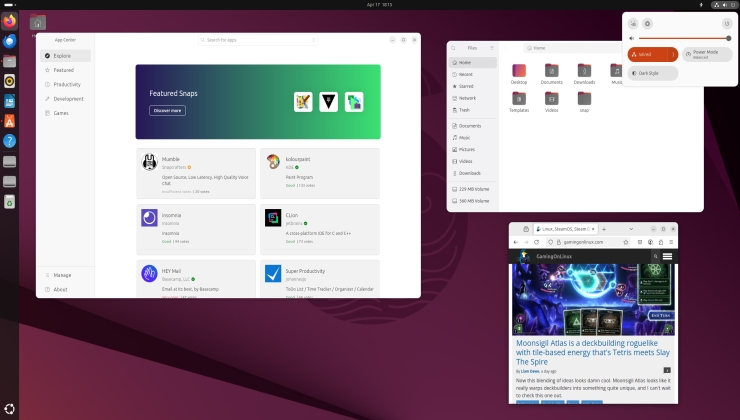The first stable update for the Steam Client of 2020, pulling in all the recent changes from the Beta versions.
For Linux users, it's a good one. It fixes the Steam Library not working on some NFS mounts, fixes a crash while prepare the Hardware Survey and some tweaks to the Steam Runtime system info gathering to only run when needed.
Remote Play handles cursor scaling better on different resolutions and for Remote Play Valve added a client-side screen magnifier for the toggle magnification controller binding. Remote Play Together also saw some updates including: letting the host see all connected controllers, letting the host drag and drop controllers to change slots and an error message was added when trying to join a game that is unavailable due to country or Family View restrictions.
For the Steam Library you can now sort by Steam Review in shelves and app grids, there's an expanded What's New settings box to tweak what you see, improved Library performance and multiple bugs were fixed.
Full changelog can be seen here.
Weirdly, yesterday we were supposed to have a Steam sale with the wider release of the newer Steam Soundtrack system but it just didn't happen. Perhaps it was too close to the Lunar sale that should be going live on the 23rd? Maybe they will bundle the two together.
As mentioned at the bottom of a recent article about the Steam Client Beta (the changes which are live now see above!), we reached out to Valve about the oddness of the recent Steam Hardware Survey showing an increase in Windows 7/Simplified Chinese of around 14%—making Simplified Chinese the current most popular language on Steam. Our message was sent onto the people involved but we've had no reply since so we've updated our dedicated Steam page with the statistics for December 2019.
Simplified Chinese the current most popular language on Steam.
I wonder how is the current status of Linux usage in the Asian market (Japan, China and South Korea). I think the Chinese one would be bigger if they had PUBG and LoL avaliable natively.
I'm talking about -dev UI editor mode, there is no font css option for the list.
There is big potential for Linux in China. Due to the conflict between Trump and Huawei, the Chinese are threatening to [drop Windows in all of the government offices](https://mspoweruser.com/china-replace-windows-pcs/). Also [WPS Office](https://www.wps.com/), that is the standard office suite for at least some government branches, already [supports Linux](http://linux.wps.com/) (and is really good actually). But until something more concrete happens, I don't think we will see a lot of Chinese Linux users.Simplified Chinese the current most popular language on Steam.I wonder how is the current status of Linux usage in the Asian market (Japan, China and South Korea). I think the Chinese one would be bigger if they had PUBG and LoL avaliable natively.
Of course all of this is just conjecture. :S:
Biggest point keeping Chinese people from using Linux is the ridiculously bad support of... Chinese.There is big potential for Linux in China. Due to the conflict between Trump and Huawei, the Chinese are threatening to [drop Windows in all of the government offices](https://mspoweruser.com/china-replace-windows-pcs/). Also [WPS Office](https://www.wps.com/), that is the standard office suite for at least some government branches, already [supports Linux](http://linux.wps.com/) (and is really good actually). But until something more concrete happens, I don't think we will see a lot of Chinese Linux users.Simplified Chinese the current most popular language on Steam.I wonder how is the current status of Linux usage in the Asian market (Japan, China and South Korea). I think the Chinese one would be bigger if they had PUBG and LoL avaliable natively.
Of course all of this is just conjecture. :S:
In every single Distro, it is a maddeningly hard thing to get even some support for Chinese typing going. Digging through many menus, reading through many guides, getting many failures as things are done radically different everywhere (so the chance the guide you are reading will completely work for you is very low)...
And even when you do manage to set up something, it is not up to speed with Chinese implementations on Mac or Windows.
ibus, fcitx, they are honestly all not only user unfriendly, but actively hostile to beings who are not tech heads themselves. I'm definitely a techie, and this is consistently catastrophic across all distros I ever used.
It truly shows you the worst effects of Linux's fragmentation. A single useful ibus-variant would be 10x better than all the crappy substitutes.
I see no way for this to change without a significant monetary investment to get professionals working on it beyond hobbyism.
Bit of a hen/egg problem. No Chinese users -> bad pinyin -> no Chinese users.
Last edited by TheSHEEEP on 21 Jan 2020 at 1:19 pm UTC
There is big potential for Linux in China. Due to the conflict between Trump and Huawei.
I personally don't think the government can be a change factor for home users to switch to Linux, due to the fact that most of then are used to windows XP/7 (pirate copies of course) and even the companies are used to care only about windows and android (which are systems they can force arbitrary software to common users).
Biggest point keeping Chinese people from using Linux is the ridiculously bad support of... Chinese.
It's probably way more difficult for then to support Linux, due to vasty majority of documents being in english (or another roman alphabet language) and the fact that they alone have 3 different languages I think. I already imagine how difficult can be for an english speaker to read anything in my language, so I imagine then :P
Ironically, I think Deepin DE has the potential to be the best DE due to how good they make it user friendly, yes the support is still bad due to many bugs, but still it's a very good software made by Chinese devs.
anyway...what happened to Red Flag Linux??There's also [openEuler](https://openeuler.org/en/) by Huawei.
I believe it can currently be summed up as "pathetic". Frankly, I think they have lots of good reasons to use Linux, but it seems they have more reasons not to (not sure how good those reasons are though).Simplified Chinese the current most popular language on Steam.
I wonder how is the current status of Linux usage in the Asian market (Japan, China and South Korea).
I dunno. IBM (Windows) PCs became big at home because they were what people used at work. And the Chinese public sector is big. Even if it doesn't influence home use much, the Chinese government sector all by itself has to be bigger than most countries. If they really dump Windows off most government machines like that article claims, the flippin' Year of the Linux Desktop just arrived. Not much help for gaming, admittedly. Or not directly, not yet.There is big potential for Linux in China. Due to the conflict between Trump and Huawei.
I personally don't think the government can be a change factor for home users to switch to Linux, due to the fact that most of then are used to windows XP/7 (pirate copies of course) and even the companies are used to care only about windows and android (which are systems they can force arbitrary software to common users).
I believe it can currently be summed up as "pathetic". Frankly, I think they have lots of good reasons to use Linux, but it seems they have more reasons not to (not sure how good those reasons are though).
Agreed, and the reasons are probably the same as the rest of the world (Plus the fact that vendors can't force their embeed software)
I dunno. IBM (Windows) PCs became big at home because they were what people used at work. And the Chinese public sector is big.It's big with android devices for sure. I'm not sure about how strong is their notebook market, my currently Acer doesn't flash the BIOS without Windows, so I can assume that Windows is still the only standard for them, and desktop for home users is nowadays a niche between designers and gamers mostly.
Even if it doesn't influence home use much, the Chinese government sector all by itself has to be bigger than most countries. If they really dump Windows off most government machines like that article claims, the flippin' Year of the Linux Desktop just arrived. Not much help for gaming, admittedly. Or not directly, not yet.
The only way I think the government would move to Linux is if they see Windows as a privacy threat for them like Trump sees their devices for USA, and even so, I doubt we would see any contribution back to "us"
Sadly the Chinese government is more worry about watch their people, and Windows is for sure a excellent tool for the job
Wait, in China the public sector, like at work, use Android devices to get their work done? Is that really a thing in offices? Because I know in North America a lot of people have shifted to tablets and even phones for home use, but at the office desktop machines still rule--because you're, like, trying to do things, write stuff and such.I dunno. IBM (Windows) PCs became big at home because they were what people used at work. And the Chinese public sector is big.It's big with android devices for sure. I'm not sure about how strong is their notebook market, my currently Acer doesn't flash the BIOS without Windows, so I can assume that Windows is still the only standard for them, and desktop for home users is nowadays a niche between designers and gamers mostly.
Goes beyond privacy threat now, seems like it's also part of the trade war--like, you fuck with our tech companies, we'll fuck with your tech companies. I have doubts about that article Linas linked--Even if it doesn't influence home use much, the Chinese government sector all by itself has to be bigger than most countries. If they really dump Windows off most government machines like that article claims, the flippin' Year of the Linux Desktop just arrived. Not much help for gaming, admittedly. Or not directly, not yet.
The only way I think the government would move to Linux is if they see Windows as a privacy threat for them like Trump sees their devices for USA, and even so, I doubt we would see any contribution back to "us"
Sadly the Chinese government is more worry about watch their people, and Windows is for sure a excellent tool for the job
There is big potential for Linux in China. Due to the conflict between Trump and Huawei, the Chinese are threatening to [drop Windows in all of the government offices](https://mspoweruser.com/china-replace-windows-pcs/).--I've heard things of the sort before and nothing much happened. Still, did you read it? The Chinese government seems quite positive and quite aggressive in their scheduling this time around. It could be real. If it is, it'll be a big thing. And they might not contribute back, at first at least, but they wouldn't be the first to try operating like that and realize in the end that it's just too much of a pain to keep maintaining an effectively forked version.
Or maybe it's intended mainly as a trade bargaining chip, something they can swap for the Americans easing off on Huawei. But the Americans won't. The US foreign policy establishment see the security of American world domination as far more important than security of the actual United States or the people living there. And they see high tech dominance as a crucial part of that world domination. Huawei doing important high tech stuff and supplanting US-associated multinationals worldwide is, to the US foreign policy establishment, not a minor trade loss but an existential threat; they will do almost anything to try to stop it.
So if the Chinese make threats as bargaining chips, such as "We will dump Windows if you don't stop hassling Huawei", even if they have no real intention of doing it they may well end up having to follow through or look weak.
Last edited by Purple Library Guy on 22 Jan 2020 at 5:16 pm UTC
Wait, in China the public sector, like at work, use Android devices to get their work done? Is that really a thing in offices?
home users
Goes beyond privacy threat now, seems like it's also part of the trade war--like, you fuck with our tech companies, we'll fuck with your tech companies.
While I agree this make sense, I don't think the companies from Silicon Valley would be happy to potentially lose their "clients", so in this case I think the most likely scenario would be Microsoft (or maybe Apple) delivering a "Windows China Edition" compliant with whatever their government rules they have, rather to convince everyone to change to a no-face Linux.
There is big potential for Linux in China. Due to the conflict between Trump and Huawei
I don't want to extend this subject here (way off-topic to GOL) so I will only express what I think with this: Smoke Curtain
The US foreign policy establishment see the security of American world domination as far more important than security of the actual United States or the people living there.
Windows 10 remember us that "average users" don't know nor care about privacy in a general tech scope, as long as it delivers their common needs. Anyone claiming different is probably government/company propaganda.
So if the Chinese make threats as bargaining chips, such as "We will dump Windows if you don't stop hassling Huawei", even if they have no real intention of doing it they may well end up having to follow through or look weak.
I call this the "SteamOS move" ;)








 How to set, change and reset your SteamOS / Steam Deck desktop sudo password
How to set, change and reset your SteamOS / Steam Deck desktop sudo password How to set up Decky Loader on Steam Deck / SteamOS for easy plugins
How to set up Decky Loader on Steam Deck / SteamOS for easy plugins
See more from me